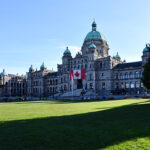Home »

New paradigm or more of the same?
The 2012 Budget, announced yesterday by the BC Liberals, recognizes the “new paradigm in today’s world economic environment,” according to Finance Minister Kevin Falcon.
But to the opposition NDP, it is “more of the same.”
Budget 2012 aims to eliminate the deficit, protect public services, and build a more competitive economy that attracts jobs and investment, stated a Feb. 21 Ministry of Finance press release.
“Budget 2012 shows the deficit forecast for 2011-12 improved by $594 million over second Quarterly Report projections to $2.5 billion. The province forecasts a deficit of $968 million in 2012-13, and surpluses of $154 million in 2013-14 and $250 million in 2014-15.
“Over the next three years, government will contain spending growth to an annual average of two per cent while continuing to protect health and education funding. The Ministry of Health budget will increase $1.5 billion over the three-year fiscal plan to nearly $17.3 billion in 2014- 15. While continuing to achieve key health outcomes that lead the country, government will work to reduce the rate of growth in health spending through an ongoing focus on identifying additional best practices for delivering care and finding administrative savings,” Falcon’s release outlined.
Additionally, despite declining enrolment, school districts funding will increase. “In addition to the $4.7 billion a year districts will receive for the next three years, government is investing an additional $165 million to establish a fund to deal directly with issues of class composition. The annual facilities grant for maintenance again totals $110 million in 2012-13.
Taxpayer-supported capital spending on schools, hospitals and other infrastructure across the province over the next three years is expected to total $10.7 billion, the budget estimates.
“Government remains committed to funding critical social services and is reallocating contingency funds to the ministries of justice and social development, where caseloads continue to rise.”

Columbia River-Revelstoke MLA Norm Macdonald said he doesn’t see anything outstanding about the budget and believes the Liberals have failed to address key issues in the province.
BC Liberal budget fails to address key issues
“Too many times this government has put forward budget numbers that turned out be inaccurate, so it’s hard to take these numbers too seriously,” Macdonald said.
The budget “appears to be more of the same from a government that has presided over the erosion of key government services and the mismanagement of taxpayers’ dollars over the last 11 years, he stated in a press release.
“But what is clear is that Premier Christy Clark is continuing to follow the same path of cutting key services and wasting money on things like advertising campaigns that are nothing more than government propaganda,” Macdonald said.
“People in my area are clear that they expect their government to provide quality health and education services. They expect the justice system to work. And they expect government to be a good steward of our land base.
“But after 11 years of BC Liberal government, rural communities have less access to healthcare, seniors are not getting the care they deserve and our public lands are not being managed properly for the future.
“In fact, they are continuing to cut funding for forest health, despite recent reports from the Auditor General and from forest professionals that our public forest lands are in crisis,” Macdonald noted.
Among other highlights of Falcon’s budget are new tax measures that benefit seniors, families and businesses in B.C., including: The B.C. First-Time New Home Buyers’ Bonus of up to $10,000; The B.C. Seniors’ Home Renovation Tax Credit of up to $1,000; and the Children’s Fitness Credit and the Children’s Arts Credit.
The budget also features tax measures for business that: eliminate the provincial jet fuel tax for international flights; provide an additional $3 million for the Small Business Venture Capital Program; extend the Training Tax Credit program; introduce new training tax credits for shipbuilding and ship repair industry employers; and make permanent the existing temporary municipal tax rate caps for B.C.’s major port terminals.
“Given the uncertain fiscal environment, the small business corporate tax rate will be maintained at 2.5 per cent, and will be revisited after the fiscal situation has improved. The fiscal plan also includes a temporary, one-point increase in the general corporate income tax rate to 11 per cent, effective April 1, 2014. The requirement to implement this tax measure will be re-evaluated in next year’s budget. Additionally, to help spur economic activity throughout the province and generate needed revenue, government will release non-strategic surplus assets for sale,” the Finance Ministry release explains.
The budget also takes into account the actual environment, Falcon said.
“Over the next year, the government will undertake a comprehensive review of the revenue-neutral carbon tax. The review will cover all aspects of the carbon tax-both positive and negative-including revenue neutrality, and it will consider the impact on the competitiveness of B.C. businesses, and in particular B.C. food producers.”
It is expected that the debt-to-gross domestic product ratio will rise the next three years, to17.6 per cent in 2012-13, 18.2 per cent in 2013-14, and peak at 18.3 per cent in 2014-15, before trending downward once again.
The government forecasts B.C.’s economy will grow by 1.8 per cent in 2012, 2.2 per cent in 2013 and 2.5 per cent per cent in 2014.
“There is a new paradigm in today’s world economic environment. It demands prudent fiscal discipline. With Budget 2012, we continue to hold the line on spending and will achieve a surplus in 2013-14, as required by law,” Falcon stated.
“Despite the challenging economic environment, Budget 2012 provides strategic investments and incentives that support families and job creators throughout the province.Our corporate income tax rates are now among the lowest in the country and G7 nations. I believe we can balance without the increase, and it will only be triggered if the fiscal situation worsens beyond our already-conservative assumptions,” he concluded.
Macdonald said he still doesn’t see how the government will push the province forward with how it prioritizes funding.
“Years of BC Liberal mismanagement, overspending on pet projects, and tax cuts to corporations and the wealthy have left the province unable to fund the services that government is obligated to provide. And BC Liberals have passed on significant increased costs to British Columbians through rising BC Hydro rates, ICBC premium increases, and hikes to Medical Services Plan fees,” he stated.
“British Columbians need a government that understands its responsibility to its taxpayers. Taxpayers need to feel confident that their government is focused on providing vital services, improving economic opportunities and protecting our environment. This is the very least that a citizenry should expect from its government,” Macdonald said.
Ian Cobb/e-KNOW







